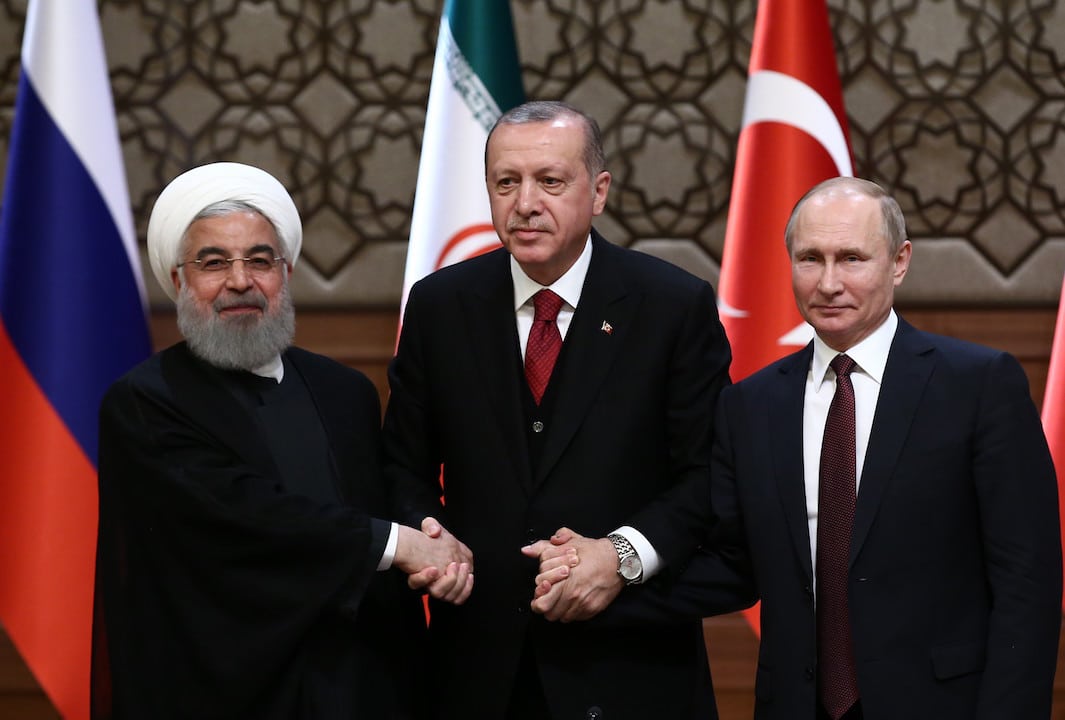Analysis
Tehran Summit focuses on Idlib and the future of Syria
Russia, Iran and Turkey all want something from the Tehran Summit: Turkey, pressure on the Kurds; Iran, sanctions relief; and Russia, a reliable puppet state.

Some are saying the Tehran summit was the “last hope” for the civilians living in the Syrian region of Idlib. Others described it as a kind of “Yalta Conference” in which the political leaders of the three main countries involved in the Syrian crisis—Russia, Iran and Turkey—are to decide the future makeup of Syria.
More realistically, the tripartite summit which took place Friday in Tehran between Vladimir Putin, Hassan Rouhani and Recep Tayyip Erdogan aimed at defining the limits and scope of the imminent military operation of the Syrian Armed Forces for the recapture of the Idlib region, currently in the hands of the al-Qaeda allies the Nusra Front, as well as ensuring that Turkish interests are safeguarded. Turkey aims to convince the Russians and the Iranians, allies of Syrian President Bashar Assad, to limit the targets of the attack to just al-Qaeda militants, and not to engage any other “rebel” armed groups who are de facto acting on Erdogan’s orders—such as the so-called Free Syrian Army, which Ankara has recently deployed against the Kurds. But Idlib and Syria are not the only topic of the summit.
The talks were also (and perhaps even more prominently) set to focus on regional economic cooperation and ways to maintain the flow of trade in the face of US sanctions, which, for different reasons, are currently targeting all three countries.
The summit, organized within the framework of the Astana process, the third meeting in a year between the three leaders, was supposed to be held in Tabriz. Then, Iran decided to move it to Tehran, perhaps to send a stronger signal about its importance. The immediate goal of the talks is developing an arrangement to protect the Syrian civilians—more than three million currently in Idlib—who will risk paying the ultimate price while the Syrian Army and its allies will be fighting the al-Qaeda militants (at least 10,000 according to some sources) and other armed groups that have been in control of the region for years, the last region of some importance that Damascus has not re-established its authority over yet.
There have been rumors that the talks would result in the establishment of protected corridors that fleeing civilians will be able to travel on to reach safer areas. But will they be able to do so during live fighting? In recent months, during the siege of the East Ghouta region, militiamen refused for many days to allow civilians to leave the villages being bombed by the government and to take advantage of the safe route of passage arranged with the participation of Russia.
Moscow wants an agreement, but it will not back down on supporting Bashar Assad’s intention to liberate Idlib. The Russians sent a very clear message Thursday: “We have killed, are killing and will continue to kill” terrorists in Syria, said Foreign Ministry spokesperson Maria Zakharova, stressing that “peace must be brought back” to the country, “whether it’s Aleppo, Idlib or other locations in Syria,” because “this is a matter of our security.”
Turkey, which has condemned the recent Russian air attacks on Idlib, argues that military action must “distinguish civilians from the terrorists groups.” Actually, Erdogan’s concern is aimed at something else: struggling with a severe economic crisis, the Turkish president wants to avoid a new influx of Syrian refugees at the country’s border. Two days ago, Turkish Foreign Minister Cavusoglu warned: “We are working to return Syrians to secure regions, but it is not clear where the two million refugees will go […] Where will the terrorists go? They could come to Turkey, they could return to their home countries, they could head to Europe. This is dangerous.” Cavusoglu also proposed conducting joint intelligence operations to identify members of terrorist groups and eliminate them without causing civilian casualties.
The pressing issue for Iran is for the summit to conclude with concrete agreements to circumvent the economic sanctions ordered by Donald Trump. “Erdogan, Rouhani and Putin will exchange views and elaborate on other issues including economic relations and a plan against U.S.-imposed sanctions as all countries have been exposed to these sanctions,” an Iranian political and religious official told the Turkish newspaper The Daily Sabah on Thursday. Tehran aims at increasing overall trade with Turkey from $10 billion to $30 billion. If possible, it wants to also agree on a common monetary policy—such as abandoning the dollar in commercial transactions—in response to the sharp devaluation of the currencies of the three countries because of Washington’s policies.
Originally published at https://ilmanifesto.it/summit-tehran-al-centro-idlib-e-lassetto-futuro-della-siria/ on 2018-09-07
